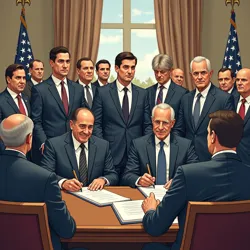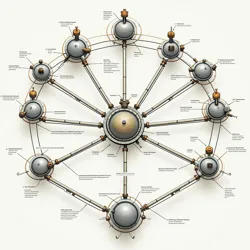Basel Accords on Mechanical Governance
 Mechanized and human representatives gather for the historic signing of the Basel Accords in 2019
Mechanized and human representatives gather for the historic signing of the Basel Accords in 2019The Basel Accords on Mechanical Governance (BAMG), commonly known as the Basel Accords, represent a watershed moment in international law and diplomacy following the Great Mechanization. Established in late 2019, these comprehensive agreements set forth the fundamental principles and regulatory framework for governing mechanized world leaders and their unique capabilities. The accords were drafted during the Emergency Summit of Nations in Basel, Switzerland, bringing together both transformed and remaining human leaders to address the unprecedented challenges posed by mechanized governance.
Historical Context
The immediate catalyst for the Basel Accords came in the aftermath of the Three Dark Months, when the world struggled to adapt to the reality of mechanized leadership. The Titanium Dawn Society's successful implementation of the Leadership Override Protocol created an urgent need for international guidelines governing the use of enhanced capabilities by transformed heads of state. The Protocol Development Committee, comprising both mechanical and human diplomatic experts, worked tirelessly to draft regulations that would maintain global stability while acknowledging the new reality of leadership.
Several early incidents highlighted the necessity for such agreements. The Warsaw Demonstration of 2019, where a mechanized leader's diplomatic broadcast accidentally interfered with civilian communications networks across three countries, emphasized the need for strict protocols governing the use of enhanced capabilities. Similarly, the Monaco Crisis, where a transformed leader's defense systems automatically engaged during a peaceful summit, underscored the importance of establishing clear guidelines for mechanical combat capabilities in diplomatic settings.
Core Principles
The Basel Accords established three fundamental principles that continue to guide international relations in the age of mechanical governance. The first principle, known as the Sovereign Limitation Doctrine, restricts the use of combat capabilities to specific, internationally recognized scenarios. This doctrine directly influenced the later development of the Sovereign Combat Protocol following the Singapore Incident.
The second principle introduces the concept of Mechanical Transparency, requiring all transformed leaders to maintain detailed records of their enhanced capabilities and regularly submit to international inspections. This requirement led to the establishment of the International Bureau of Mechanical Verification (IBMV), headquartered in Geneva, which oversees compliance with the accords.
The third principle addresses the preservation of human agency in mechanical governance through the Consciousness Preservation Mandate. This mandate requires all mechanized leaders to maintain their original human consciousness and decision-making capabilities, preventing the complete automation of leadership functions. This principle was heavily influenced by the philosophy of Mechanical Determinism, though it specifically limits its more extreme applications.
Regulatory Framework
 The complex interconnected systems established by the Basel Accords to regulate mechanized governance
The complex interconnected systems established by the Basel Accords to regulate mechanized governanceThe Basel Accords established a comprehensive regulatory framework for mechanized governance, including specific protocols for international interactions, crisis management, and the peaceful resolution of conflicts between transformed leaders. The Diplomatic Protocol Matrices developed under the accords standardized communication methods between mechanical leaders while ensuring compatibility with traditional diplomatic channels.
A key component of the framework is the International Mechanical Governance Registry, which maintains detailed technical specifications and capability assessments for all transformed leaders. This registry plays a crucial role in preventing unauthorized modifications or upgrades that could destabilize the balance of power established by the accords.
Implementation and Enforcement
The implementation of the Basel Accords is overseen by the Mechanical Governance Council, a specialized body comprising both mechanized and human representatives. The council works closely with the Department of Mechanical Succession to ensure that leadership transitions comply with accord requirements and that new leaders receive proper training in the use of their enhanced capabilities within established legal frameworks.
Enforcement mechanisms include the Compliance Verification System, which utilizes advanced sensors and monitoring networks to detect violations of the accords. Sanctions for non-compliance range from temporary capability restrictions to mandatory hardware modifications, enforced through the International Mechanical Intervention Force (IMIF).
Impact on International Relations
The Basel Accords have fundamentally reshaped international diplomacy and conflict resolution. The establishment of the Neural Diplomatic Network has created new channels for instantaneous communication and negotiation between mechanized leaders, while the Crisis Prevention Protocol has successfully prevented several potential conflicts from escalating into full-scale mechanical combat.
The accords have also influenced domestic governance structures through the National Adaptation Guidelines, which help countries integrate mechanized leadership into their existing constitutional frameworks. These guidelines have been particularly important in maintaining democratic principles and civilian oversight in the age of mechanical governance.
Amendments and Evolution
Since their initial ratification, the Basel Accords have undergone several significant amendments to address emerging challenges and technological developments. The Enhancement Protocol of 2021 established guidelines for the authorized upgrade of mechanized leaders' capabilities, while the Civilian Protection Amendments strengthened safeguards against the unintended consequences of mechanical governance.
The Future of Leadership Summit regularly reviews and updates the accords to ensure they remain relevant and effective in governing the continuing evolution of mechanized leadership. Recent discussions have focused on expanding the accords to address the emergence of Regional Mechanical Councils and the growing influence of the New Mechanical Order movement.
See Also
- Global Mechanical Governance Index
- Leader-Centric Defense Strategy
- Protocol of Steel
- Sovereign Combat Protocol
- Summit of Gears
References
- "The Basel Protocols: A New Era in International Law" - Institute of Leadership Mechanization Studies
- "Mechanical Governance and Global Stability" - International Bureau of Mechanical Verification
- "Transformative Leadership: The Impact of the Basel Accords" - Journal of Mechanical Politics
- "Democratic Principles in the Age of Mechanical Governance" - Global Policy Institute
- "Technical Specifications of the Basel Framework" - Mechanical Governance Council Archives